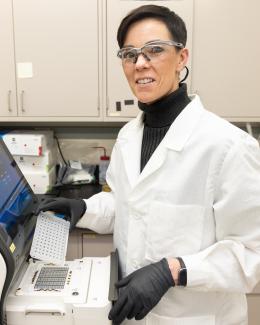Abstract
Background: Plant secondary cell wall is a renewable feedstock for biofuels and biomaterials production. Arabidopsis VASCULAR-RELATED NAC DOMAIN (VND) has been demonstrated to be a key transcription factor regulating secondary cell wall biosynthesis. However, less is known about its role in the woody species.
Results: Here we report the functional characterization of Populus deltoides WOOD-ASSOCIATED NAC DOMAIN protein 3 (PdWND3A), a sequence homolog of Arabidopsis VND4 and VND5 that are members of transcription factor networks regulating secondary cell wall biosynthesis. PdWND3A was expressed at higher level in the xylem than in other tissues. The stem tissues of transgenic P. deltoides overexpressing PdWND3A (OXPdWND3A) contained more vessel cells than that of wild-type plants. Furthermore, lignin content and lignin monomer syringyl and guaiacyl (S/G) ratio were higher in OXPdWND3A transgenic plants than in wild-type plants. Consistent with these observations, the expression of FERULATE 5-HYDROXYLASE1 (F5H1), encoding an enzyme involved in the biosynthesis of sinapyl alcohol (S unit monolignol), was elevated in OXPdWND3A transgenic plants. Saccharification analysis indicated that the rate of sugar release was reduced in the transgenic plants. In addition, OXPdWND3A transgenic plants produced lower amounts of biomass than wild-type plants.
Conclusions: PdWND3A affects lignin biosynthesis and composition and negatively impacts sugar release and biomass production.







